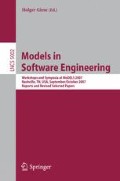Abstract
User-interface design is still a time consuming and expensive task to do, but recent advances allow generating them from interaction design models. We present a model-driven approach for generating user interfaces out of interaction design models. Our interaction design models are discourse models, more precisely models of classes of dialogues. They are based on theories of human communication and should, therefore, be more understandable to humans than programs implementing user interfaces. Our discourse models also contain enough semantics to transform them automatically into user interfaces for multiple devices and modalities. This paper presents a two-step transformation approach with an intermediate user interface model. By showing specific transformation rules, we concentrate on a major part of the first step, transforming discourse models to structural user interface models.
Access this chapter
Tax calculation will be finalised at checkout
Purchases are for personal use only
Preview
Unable to display preview. Download preview PDF.
References
Bogdan, C., Falb, J., Kaindl, H., Kavaldjian, S., Popp, R., Horacek, H., Arnautovic, E., Szep, A.: Generating an abstract user interface from a discourse model inspired by human communication. In: Proceedings of the 41th Annual Hawaii International Conference on System Sciences (HICSS-41), Piscataway, NJ, USA, IEEE Computer Society Press, Los Alamitos (2008)
Botterweck, G.: A model-driven approach to the engineering of multiple user interfaces. In: Nierstrasz, O., Whittle, J., Harel, D., Reggio, G. (eds.) MoDELS 2006. LNCS, vol. 4199, Springer, Heidelberg (2006)
Calvary, G., Coutaz, J., Thevenin, D., Limbourg, Q., Bouillon, L., Vanderdonckt, J.: A unifying reference framework for multi-target user interfaces. Interacting With Computers 15/3, 289–308 (2003)
den Bergh, J.V., Coninx, K.: From task to dialog model in the UML. In: Winckler, M., Johnson, H., Palanque, P. (eds.) TAMODIA 2007. LNCS, vol. 4849, pp. 98–111. Springer, Heidelberg (2007)
Falb, J., Kaindl, H., Horacek, H., Bogdan, C., Popp, R., Arnautovic, E.: A discourse model for interaction design based on theories of human communication. In: CHI 2006 extended abstracts on Human factors in computing systems CHI 2006 (2006)
Falb, J., Popp, R., Röck, T., Jelinek, H., Arnautovic, E., Kaindl, H.: Using communicative acts in interaction design specifications for automated synthesis of user interfaces. In: Proceedings of the 21th IEEE/ACM International Conference on Automated Software Engineering (ASE 2006), Piscataway, NJ, USA, pp. 261–264. IEEE Computer Society Press, Los Alamitos (2006)
Falb, J., Popp, R., Röck, T., Jelinek, H., Arnautovic, E., Kaindl, H.: Fully-automatic generation of user interfaces for multiple devices from a high-level model based on communicative acts. In: Proceedings of the 40th Annual Hawaii International Conference on System Sciences (HICSS-40), Piscataway, NJ, USA, January 2007, IEEE Computer Society Press, Los Alamitos (2007)
Florins, M., Simarro, F.M., Vanderdonckt, J., Michotte, B., Michotto, B.: Splitting rules for graceful degradation of user interfaces. In: AVI 2006: Proceedings of the working conference on Advanced visual interfaces, pp. 59–66. ACM Press, New York (2006)
Luff, P., Gilbert, N., Frohlich, D.: Computers and Conversation. Academic Press, London (1990)
Mann, W.C., Thompson, S.: Rhetorical Structure Theory: Toward a functional theory of text organization. In: Text, pp. 243–281 (1988)
Mori, G., Paterno, F., Santoro, C.: Design and development of multidevice user interfaces through multiple logical descriptions. IEEE Transactions on Software Engineering 30(8), 507–520 (2004)
Roberts, D., Berry, D., Isensee, S., Mullaly, J.: Developing software using OVID. IEEE Software 14(4), 51–57 (1997)
Searle, J.R.: Speech Acts: An Essay in the Philosophy of Language. Cambridge University Press, Cambridge (1969)
van Harmelen, M.: Object oriented modelling and specification for user interface design. In: Interactive Systems: Design, Specification and Verification (1994)
Author information
Authors and Affiliations
Editor information
Rights and permissions
Copyright information
© 2008 Springer-Verlag Berlin Heidelberg
About this paper
Cite this paper
Kavaldjian, S., Bogdan, C., Falb, J., Kaindl, H. (2008). Transforming Discourse Models to Structural User Interface Models. In: Giese, H. (eds) Models in Software Engineering. MODELS 2007. Lecture Notes in Computer Science, vol 5002. Springer, Berlin, Heidelberg. https://doi.org/10.1007/978-3-540-69073-3_9
Download citation
DOI: https://doi.org/10.1007/978-3-540-69073-3_9
Publisher Name: Springer, Berlin, Heidelberg
Print ISBN: 978-3-540-69069-6
Online ISBN: 978-3-540-69073-3
eBook Packages: Computer ScienceComputer Science (R0)

